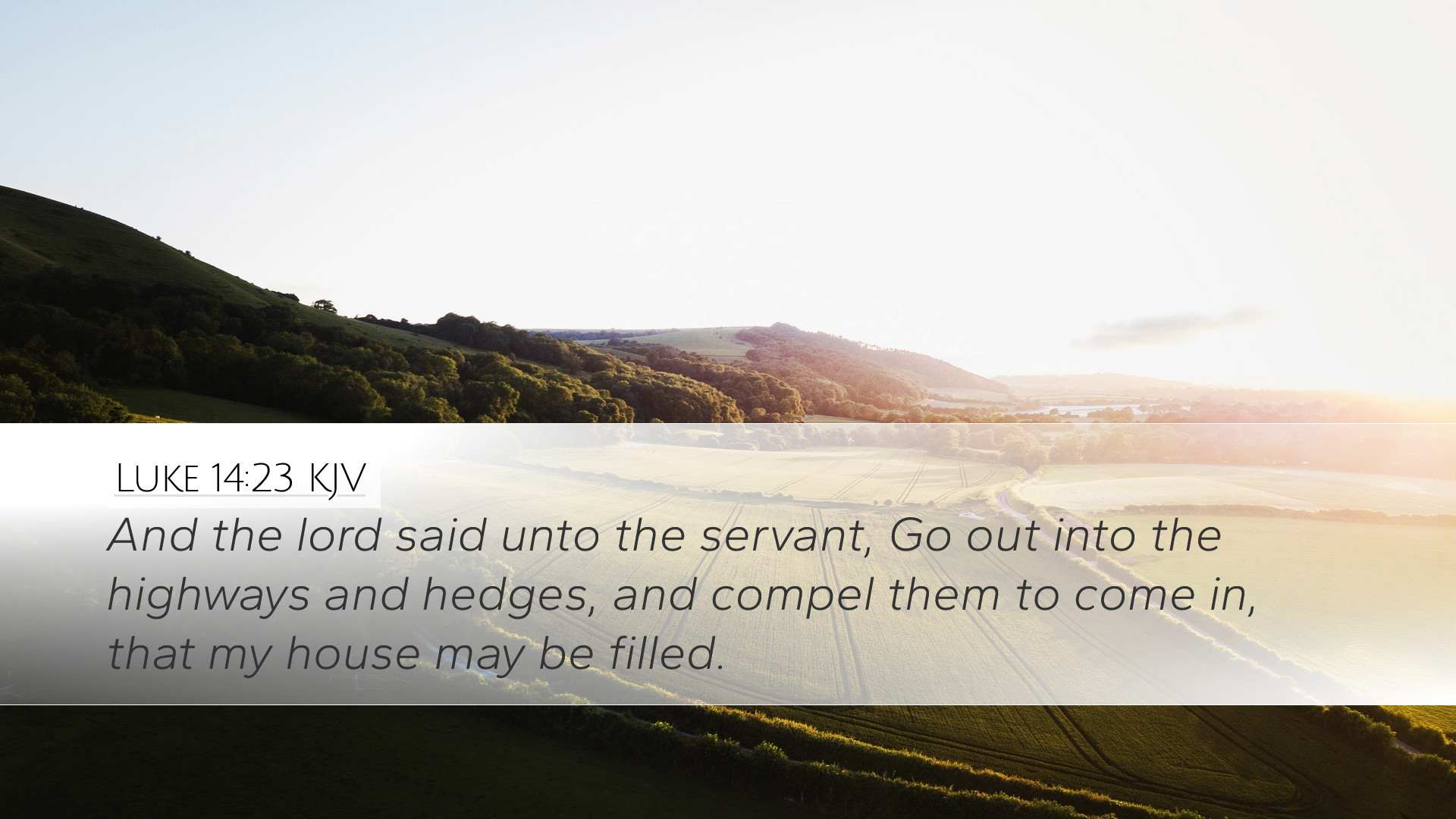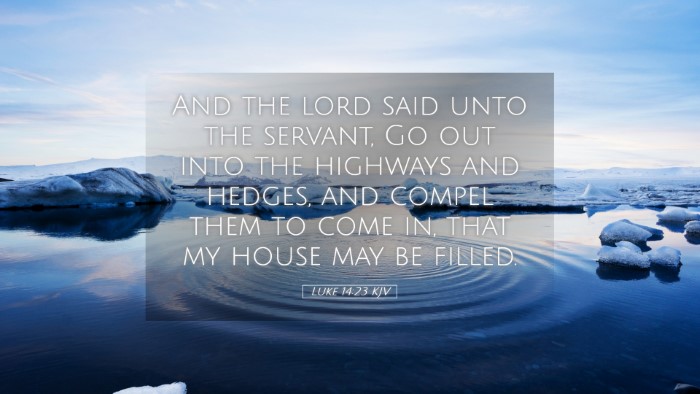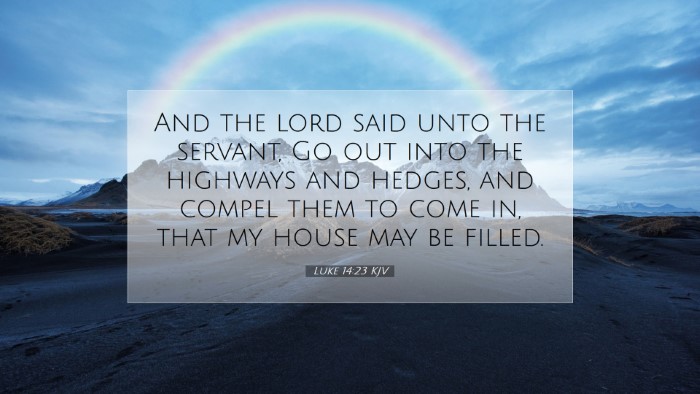Commentary on Luke 14:23
Verse: Luke 14:23 - "And the Lord said unto the servant, Go out into the highways and hedges, and compel them to come in, that my house may be filled."
Introduction
This verse is part of a larger parable spoken by Jesus, known as the Parable of the Great Banquet. In this parable, Christ outlines the invitation to His Kingdom and the urgency of the Gospel's spread. The call to "go out into the highways and hedges" signifies the mission to reach those who are marginalized, overlooked, or outside the traditional circles of society. Scholars and theologians emphasize the importance of this verse in understanding the inclusive nature of God's invitation to His people.
Contextual Background
In the preceding verses, Jesus tells of a man who prepared a great banquet and invited many guests. However, those invited made excuses and declined the invitation. Consequently, the master commands his servant to seek others, indicating that the invitation to partake in the feast is extended beyond the original guests. This act serves as a metaphor for God's Kingdom, demonstrating that it is open to all who will come, regardless of their status or past.
Public Domain Commentary Insights
Matthew Henry
Matthew Henry emphasizes the urgency and necessity of the servant's commission. He notes that "to compel" does not imply coercion but rather an earnest effort to persuade those who are indifferent. The highways and hedges represent both the literal and figurative spaces where people may be found—those who are distracted, busy, or even resistant to the call of the Gospel. Henry asserts that God desires His house to be filled, and this reflects His love and grace towards humanity.
- Compulsion through Love: Henry argues that the compulsion to gather others should come from a place of love, not obligation.
- God’s Will: The insistence that His house may be filled reveals God's desire and divine will for all to be saved.
- Inclusivity of God’s Kingdom: The parable showcases that no one is too far gone from receiving God’s grace; the invitation is extended to all, including those in societal margins.
Albert Barnes
Albert Barnes interprets the directive as a profound demonstration of God's outreach to humanity. He highlights that the message to "go out" reflects an active role that believers must undertake—actively seeking the lost. Barnes contrasts the reluctance of the invited guests with the eagerness of those who will accept the call, recognizing that the excluded ones often possess a greater readiness to respond. Furthermore, Barnes indicates the servant’s role is one of stewardship and responsibility, urging a proactive approach to evangelism.
- Active Engagement: Barnes insists that Christians are called to actively seek out those who have not yet come to faith.
- Great Commission Connection: This command mirrors Jesus' Great Commission, reinforcing the belief that outreach is a central tenet of the faith.
- Response to the Gospel: The passage implies that those who were overlooked or marginalized often respond more readily to God’s invitation.
Adam Clarke
Adam Clarke provides a scholarly perspective, emphasizing the socio-economic implications of the parable. He highlights the "highways and hedges" as metaphors for the diverse places where the Gospel needs to be proclaimed. Clarke points out that in Jesus' time, those who frequented the highways—such as the poor, the sick, and the outcasts—often represented the very people God sought to bring into His Kingdom. Clarke suggests that the act of compelling them to come is also a reflection of God’s persistent grace, striving toward those who may not recognize their need for Him.
- Marginalization and Inclusion: Clarke discusses societal exclusion and how God’s invitation breaks through social barriers.
- Metaphorical Geography: The various locations mentioned are not just physical locations but represent the spiritual state of individuals.
- Divine Urgency: He underscores the immediacy of the call, urging believers to understand the urgency in sharing the Gospel.
Theological Implications
The theological weight of Luke 14:23 extends beyond the narrative, prompting reflection on God’s character and mission. The heart of God is to seek and save the lost—a theme echoed throughout Scripture. The invitations to His banquet foretell the inclusive nature of God's redemptive plan, which encompasses all of humanity, irrespective of background or prior affiliation.
Key Themes to Consider
- God's Desire for Relationship: The filling of the house symbolizes God’s desire for fellowship with His people.
- Discipleship’s Dynamic Nature: The act of going out signifies the dynamic role of believers in the mission of God.
- Salvation’s Accessibility: The invitation to God's banquet is a free gift, accessible to anyone willing to respond.
Application for the Church
For pastors, students, and theologians, Luke 14:23 serves as a profound reminder of the church's mission. It is not simply a retrospective look at Jesus’ parable, but a call to action. The church is challenged to move beyond its walls into the highways and hedges of society—a metaphor for reaching those who are spiritually lost and socially marginalized. This directive calls for a renewed commitment to evangelism, social justice, and inclusivity within the church’s mission.
Practical Steps for Outreach
- Awareness of Surroundings: Encouraging congregants to be aware of and engage with those in their communities who are often overlooked.
- Building Relationships: Fostering genuine relationships that reflect Christ’s love and invite others into fellowship.
- Training in Evangelism: Providing resources and training for effective evangelistic outreach that respects and uplifts the marginalized.
- Community Engagement: Collaboration with local organizations and outreach programs to meet the needs of those in the highways and hedges.
Conclusion
Luke 14:23 remains a powerful invitation for believers to engage actively in God’s mission of reconciliation and fulfillment. Through the collective insights from Matthew Henry, Albert Barnes, and Adam Clarke, we recognize the depth of Christ's command as not just historical instruction but a living imperative. The church is called not merely to be hearers of the Word but doers, taking the beautiful message of the banquet feast and sharing it with all who are willing to come. As we reflect on this verse, may we be inspired to pursue a faith that compels us to reach out, inviting others into the transformative love of Christ.


